人教版(PEP)情态动词课件(共18张PPT)
文档属性
| 名称 | 人教版(PEP)情态动词课件(共18张PPT) |  | |
| 格式 | pptx | ||
| 文件大小 | 223.8KB | ||
| 资源类型 | 教案 | ||
| 版本资源 | 人教版(PEP) | ||
| 科目 | 英语 | ||
| 更新时间 | 2024-06-11 20:28:56 | ||
图片预览

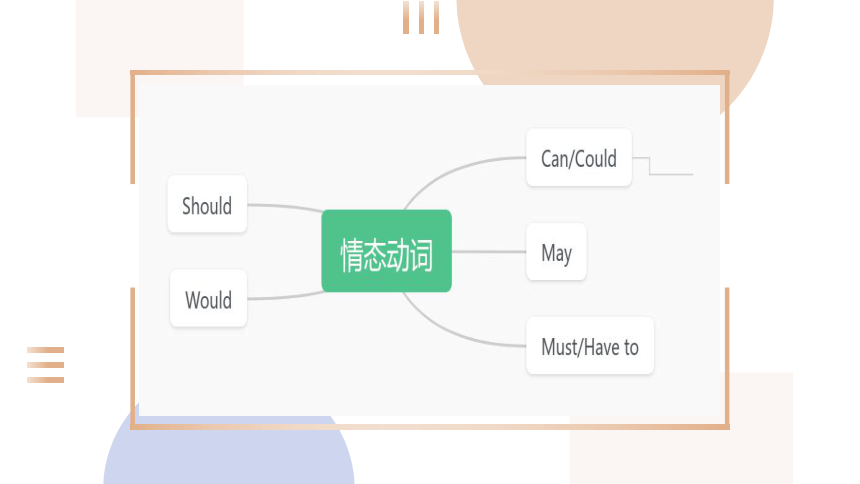
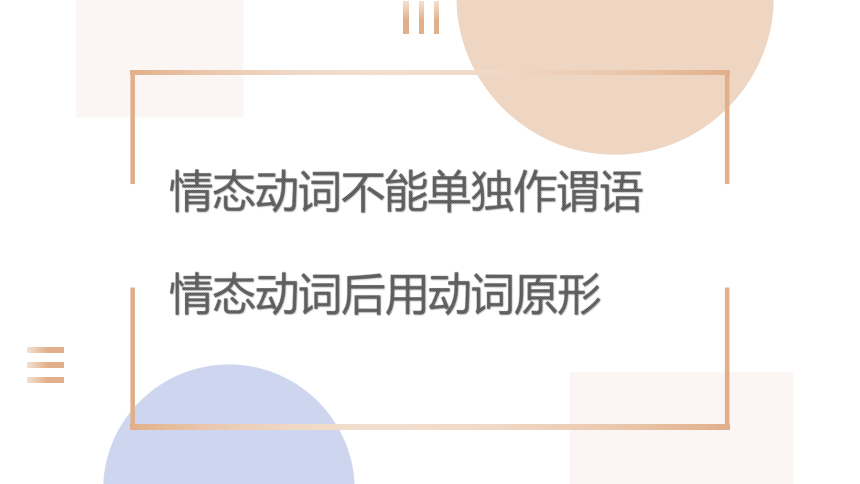

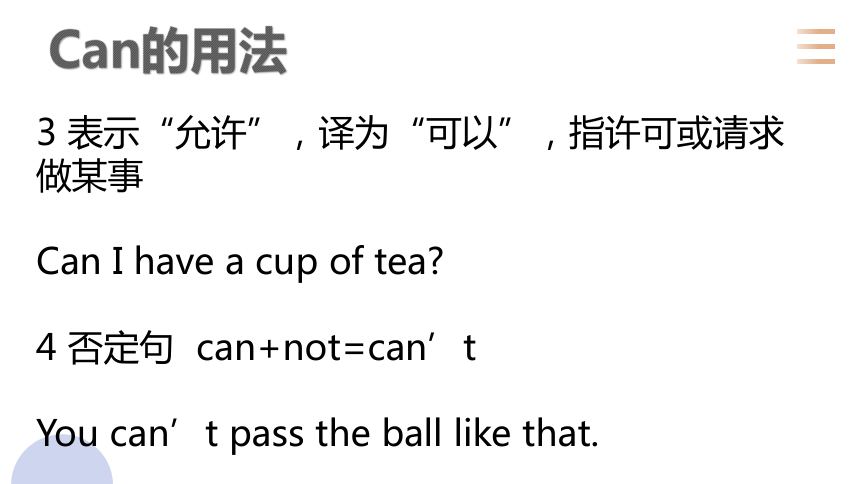
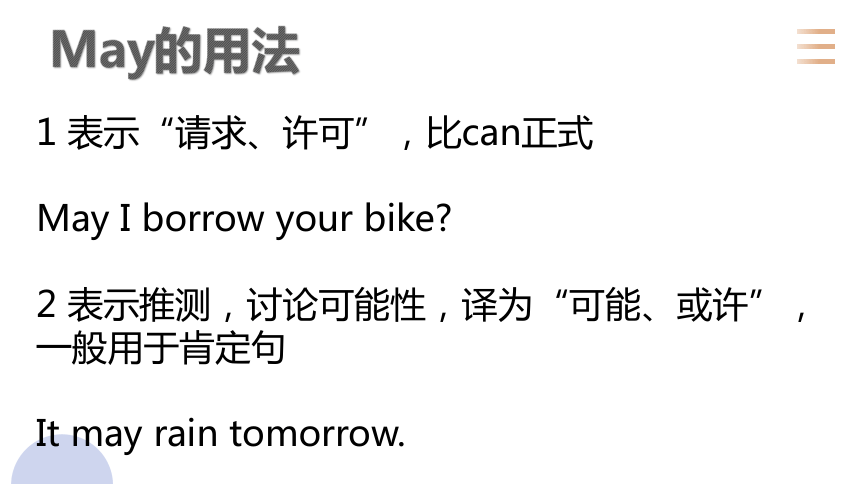
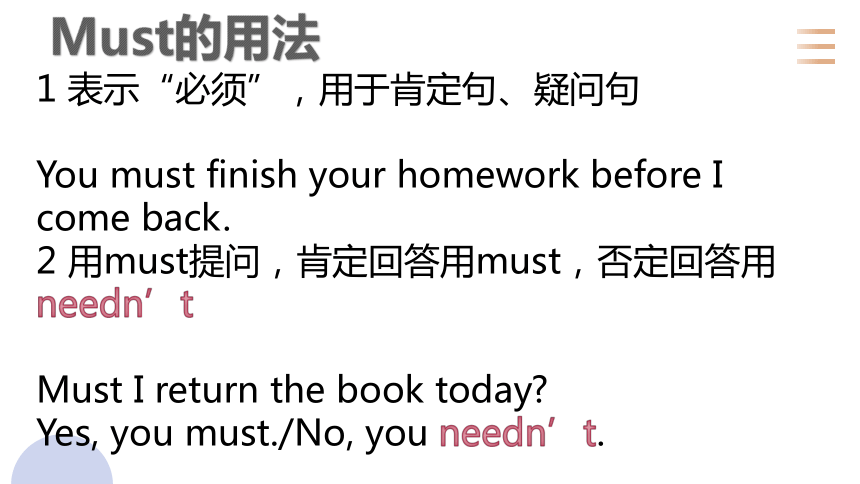
文档简介
(共17张PPT)
单击此处添加副标题
20XX/01/01
20XX
Sara
情态动词
情态动词不能单独作谓语
情态动词后用动词原形
Can的用法
1 表示“能,会”,指脑力、体力方面的能力
Jim can swim but I can’t.
2 表示“可能”,常用于“否定句、疑问句”
Can he come here, today
Can的用法
3 表示“允许”,译为“可以”,指许可或请求做某事
Can I have a cup of tea
4 否定句 can+not=can’t
You can’t pass the ball like that.
May的用法
1 表示“请求、许可”,比can正式
May I borrow your bike
2 表示推测,讨论可能性,译为“可能、或许”,一般用于肯定句
It may rain tomorrow.
Must的用法
1 表示“必须”,用于肯定句、疑问句
You must finish your homework before I come back.
2 用must提问,肯定回答用must,否定回答用needn’t
Must I return the book today
Yes, you must./No, you needn’t.
Must的用法
3 用于否定句中,mustn’t译为“一定不能,一定不要”,而不表示“不必”
You mustn’t wall your dog on the grass.
Have to的用法
Have to表示勉强“不得不”
It’s raining. I have to stay at home.
Would的用法
用于征询意见或有礼貌的请求
Would you like some juice
Should的用法
should 表示“表示义务、责任、建议或劝告”,译为“应该”
We should learn from each other.
注:语气较强,含有命令意味
You should leave at once.
Should的用法
否定式:shouldn’t,译为“不应该”
Students shouldn’t spend too much time playing computer games.
用情态动词填空
1 _________I have some juice, please
2 You__________go to school now. It’s time for school.
3 My music teacher________dance very well.
4 ______I speak to your father, John
Can
must
can
May
选择正确的答案
1 I can_________you and Mary can________you too.
A see, see B see, sees C looks, looks
2 _________I have an apple
Yes, I can.
A Can B can C Must
3 These children__________go home now. It’s too late.
A can B must C does
选择正确的答案
4 __________I finish my homework today
No, you needn’t.
A Can B Must C Should
5 Dad, you _______sit here. It’s for woman only.
A aren’t B can’t C am not
6 What________you see in the picture
A can B are C is
选择正确的答案
7 _________you sing an English song Yes, I can.
A can B Can C Must
8 __________I watch TV for a short time, Mum
No, you can’t.
A May B Am C Do
9 Who can spell this word I _________
A can B do C am
选择正确的答案
10 It’s time to go home. We_________go now.
A are B can C must
改写句子
1 She can draw pictures. (改为一般疑问句,并做否定回答)
2 He must go to bed now. (改为一般疑问句,并作否定回答)
3 I must wash my hands before I have lunch. (改为否定句)
Can she draw pictures No, she can’t.
Must he go to bed now No, he needn’t.
I mustn’t wash my hands before I have lunch.
单击此处添加副标题
20XX/01/01
20XX
Sara
情态动词
情态动词不能单独作谓语
情态动词后用动词原形
Can的用法
1 表示“能,会”,指脑力、体力方面的能力
Jim can swim but I can’t.
2 表示“可能”,常用于“否定句、疑问句”
Can he come here, today
Can的用法
3 表示“允许”,译为“可以”,指许可或请求做某事
Can I have a cup of tea
4 否定句 can+not=can’t
You can’t pass the ball like that.
May的用法
1 表示“请求、许可”,比can正式
May I borrow your bike
2 表示推测,讨论可能性,译为“可能、或许”,一般用于肯定句
It may rain tomorrow.
Must的用法
1 表示“必须”,用于肯定句、疑问句
You must finish your homework before I come back.
2 用must提问,肯定回答用must,否定回答用needn’t
Must I return the book today
Yes, you must./No, you needn’t.
Must的用法
3 用于否定句中,mustn’t译为“一定不能,一定不要”,而不表示“不必”
You mustn’t wall your dog on the grass.
Have to的用法
Have to表示勉强“不得不”
It’s raining. I have to stay at home.
Would的用法
用于征询意见或有礼貌的请求
Would you like some juice
Should的用法
should 表示“表示义务、责任、建议或劝告”,译为“应该”
We should learn from each other.
注:语气较强,含有命令意味
You should leave at once.
Should的用法
否定式:shouldn’t,译为“不应该”
Students shouldn’t spend too much time playing computer games.
用情态动词填空
1 _________I have some juice, please
2 You__________go to school now. It’s time for school.
3 My music teacher________dance very well.
4 ______I speak to your father, John
Can
must
can
May
选择正确的答案
1 I can_________you and Mary can________you too.
A see, see B see, sees C looks, looks
2 _________I have an apple
Yes, I can.
A Can B can C Must
3 These children__________go home now. It’s too late.
A can B must C does
选择正确的答案
4 __________I finish my homework today
No, you needn’t.
A Can B Must C Should
5 Dad, you _______sit here. It’s for woman only.
A aren’t B can’t C am not
6 What________you see in the picture
A can B are C is
选择正确的答案
7 _________you sing an English song Yes, I can.
A can B Can C Must
8 __________I watch TV for a short time, Mum
No, you can’t.
A May B Am C Do
9 Who can spell this word I _________
A can B do C am
选择正确的答案
10 It’s time to go home. We_________go now.
A are B can C must
改写句子
1 She can draw pictures. (改为一般疑问句,并做否定回答)
2 He must go to bed now. (改为一般疑问句,并作否定回答)
3 I must wash my hands before I have lunch. (改为否定句)
Can she draw pictures No, she can’t.
Must he go to bed now No, he needn’t.
I mustn’t wash my hands before I have lunch.
